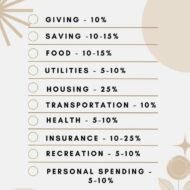Posted by Managementguru in Financial Management, How To, Personal Finance
on Aug 7th, 2022 | 0 comments

A small intro to personal finance is inevitable before we explain the 50/30/20 budget rule. Why Is Personal Finance Important? Learning Personal Finance not only helps you to manage your day-to-day financial needs but also aids in planning your financial future. The sooner you get a hold on personal finance, the better your long-term financial prospects will be for things like investing or planning for retirement. What are the 5 main components of personal finance? SavingInvestingFinancial protectionTax SavingRetirement planning The Pathway to Financial Freedom – The 5 Golden Rules of Money Let us understand what the financial experts say about how to handle money when it comes to your pocket. Payday is not only mayday but also hayday. You have to streamline your income in order to lead a hassle free and peaceful life. Rule # 1: Spend Less Than You Earn or Earn More Than You Spend Rule # 2: Create an Emergency Fund Rule #3: Save or Invest the Rest Rule #4: Capitalize on Your Skills & Create a Side Endeavor Rule #5: Own Income Generating Assets That Create Passive Income Streams The ideas listed above are truly practical in nature and works out 100% of the time. Passive income is equally important as this income stream might become your mainstream income during a dire need. We have compiled an amazing Budget Planner for your ready reference. Download and Enjoy. 👇 Tell us if you found it useful. Simple-Monthly-Budget-PlannerDownload What is the 50/30/20 Rule of Budgeting? Given below is the thumb rule for budgeting and this method is good for beginners or those who suck with money. This cheatsheet will teach you how to “Live within your means.” The beauty of 50/30/20 budget is in its simplicity. All the income is broken up into three spending buckets. 50% for the needs, 30% for wants and 20% for savings and debt. The Split 50% Needs Health life, disability and other insuranceCar insurance, maintenance and gasMedical bills and prescriptionsUtilities phone and internetPublic transportationDaycare and tuitionMortgage/rentGroceries 7 Ways to Increase Your Income! #reels 30% Wants GiftsTravelCable TVEating outCharitable donationsMakeup and hair productsHome decor and furnitureClothes, shoes and accessoriesMovie, sports and concert ticketsStreaming services and other subscriptions Signs You’re A Lot Better With Money Than You Think! #reels 20% Savings Retirement savingsPersoanl loan paymentsShort term savings goalsEducation fund What are some practical budgeting guidelines to follow? Read on to find out what budget percentages popular financial guru Dave Ramsey recommends. Here’s a breakdown of each category, based on Dave Ramsey’s advice: Giving — Ramsey recommends giving 10% of your monthly income to worthy causes.Saving — Saving 10% of your income for retirement, which ideally is within a 401(k) or IRA.Food — Includes both grocery shopping and eating out.Utilities — Cell phone, cable, internet, gas, and electricity.Housing costs — Rent or mortgage payment, along with property tax, home or renters insurance, home maintenance, HOA fees, and PMI.Transportation — Any and all transportation costs, including public transportation, car insurance, oil changes, car payment, gas, DMV fees, and parking.Health — Medical and health care bills (not including health insurance premiums) such as co-pays for doctor visits, prescriptions, and dental care.Insurance — Life insurance, health insurance, and disability insurance. Auto insurance and home insurance is placed within transportation and housing categories. Recreation — This is your fun money. Any lifestyle expenses, such as gym memberships or kids’ activities, as well as entertainment expenses like Netflix, Hulu, sporting events, concert tickets, babysitters, and travel.Personal spending — Personal care, haircuts, Amazon purchases, clothes, shoes, home furnishings, home decor, etc.Miscellaneous — The “stuff you forgot to budget for” category. The Complete Personal Finance Course: Save, Protect, Make...

Posted by Managementguru in Business Management, Financial Management, How To, How to make money online, Personal Finance, Real Estate Investment
on May 29th, 2022 | 0 comments

Commodity trading is a term used frequently in the investment world. Aside from equities, markets also trade a variety of commodities, which can help you diversify your portfolio and increase profits. Commodities, due to their fluctuating prices over time, can produce good long-term returns if invested wisely. What are Commodities? Commodities are the primary raw materials used to make everyday goods. Commodities, which include products like oil, sugar, metals, and so on, are the foundation of a global economy. There are four basic categories of commodities traded in India (see table below). Commodity Category Energy – Oil and Natural GasBase Metals – Copper Aluminium, Zinc, LeadBullion – Gold and SilverAgriculture – Cotton, Black Pepper, Rubber, Cardamom and Oil. Gold, corn, crude oil, coffee, wheat, and other commodities are among the most widely traded worldwide. The change of one commodity’s price has an impact all across the world. When crude oil prices rise, for example, the effect is felt all around the world. How To Start Trading in Commodities? To begin with commodity trading, the first step is to know about the types of commodities that exist (mentioned above). Then you need to: Open a Demat Account with a Reputed Stockbroker You’ll need a demat account to trade commodities, just like you’ll need one to trade stocks. While there are numerous brokerage houses where you may register an account, it is critical to choose a reputable organisation that can provide you with important trade suggestions. To navigate the commodity market maze, you’ll need the right information and advice. It’s also critical to choose a brokerage with competitive prices. Selecting a broker with a high brokerage fee can reduce your profits. Examine the services provided by the broker through its platform. A full-service broker is best for you because they have a team of professionals who provide in-depth research and recommendations on a regular basis. Deposit an Initial Amount You must make an initial deposit after you have opened an account. The deposit amount varies depending on the commodity you are trading and ranges from 5% to 10% of the contract value. This information can be found on the brokerage firm’s official website. You must keep a sufficient cushion to cover any potential losses. Commodity trading plans that help you better understand markets and your risk appetite are also vital. In terms of risk preferences and cash flow, each trader is unique. You make a decision based on your financial situation. Different Ways to Trade in Commodities Direct Investment It is the most prevalent method of commodity investment. You can, for example, acquire gold and silver coins and jewellery immediately. Direct investing in these things, on the other hand, has a significant transaction cost. There are also concerns about storage and purity. Purchase Stocks This is another method of commodity trading. You can acquire stocks in an energy company, for example, if you want to trade energy. The price of energy will be clearly indicated by the stock price. If you invest in commodities through direct stocks, you can make money even if the commodity isn’t performing well. For example, if you buy shares in a well-established energy company, even if energy prices fall, you can still profit due to the company’s strong fundamentals. Loading… Commodity ETFs and Mutual Funds Commodity-based ETFs and mutual funds are many. If you wish to invest in gold or silver, for example, you can buy gold or silver ETFs. Because ETFs are maintained electronically in your demat account, there are no purity or storage difficulties. Bottom Line Commodity trading can be profitable provided you understand the fundamentals and appropriately determine your risk tolerance. To get...

Posted by Managementguru in Financial Management, How To, Personal Finance
on Mar 22nd, 2022 | 0 comments

The majority of households go through times when their finances are a little out of control; it is a question of being able to catch them before they start really spiraling downwards. That can be the hardest part since you have to admit to yourself that things will have to change in order for control to be regained. Whatever you are going through, you can be guaranteed that you are not alone, which is good because it means that there are businesses and people out there to help and give advice, even about the trickiest financial issues. Draw up a budget plan Regardless of whether you feel that you are swimming against the tide with your finances or that you’re doing well, it is a good idea to draw up a budget plan and stick to it. This is so that all your hard-earned money doesn’t get flittered away and will instead be spent on things that you enjoy. Obviously, if you are finding things tight, then a budget will help you reach the goals that you’ve set and can provide that little piece of willpower that you may struggle to find in certain situations. Reduce your outgoings This can be easier said than done; however, there are savings that can be had even if it is only a couple of dollars off of your electricity bill. Changing your utility suppliers can reduce your monthly outgoings, as they often have special offers available; similarly, if you let your supplier know that you are looking to move, they may be willing to do a deal in order to keep your business. However, if you feel that you could very well be past this stage and you are looking into bankruptcy, you will have probably asked yourself the important question of will I lose my home if I file bankruptcy, and this is where you will need more specialist help. Filing for bankruptcy is not an easy decision to come to, and having a specialist on board to take care of you and answer all your questions honestly could be a way to put your mind at rest. Change the way you shop When the money situation is not going well, one of the best ways you can cut back on your spending is to change the way you shop. This does not mean to say that you must go without, as this is a very hard thing to do and can mean that you will resent your new lifestyle. If you are the sort of person that likes to go clothes shopping every week to buy the latest trends, then you may find that going once a month could very well suit your pocket better, or if you like to focus on label buys, then sourcing used clothes from the manufacturer or stores that you buy from could drop the price tag enough that it then becomes an affordable luxury. Now you know how to stay on top of your...






